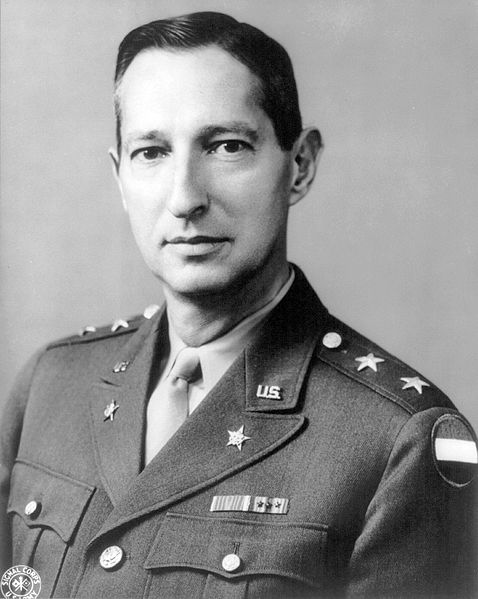General Mark Clark
Mark Clark became the youngest Lieutenant General in America in 1945. He played important roles in Operation Torch, the Allied invasion of North Africa, and in the Allied campaign in Italy.
Born in 1896, Clark was educated at the West Point Military Academy. He left just at the right time to fight in World War One in 1917, where he was seriously injured.

After the war, he stayed in the army and was promoted to major. He taught at the US Army College in Washington.
Clark was made brigadier-general in April 1941. He arrived in Britain in 1942 to help General Dwight Eisenhower to plan the French North African invasion. Allied commanders were keen to avoid bloodshed; to this end they held hopes of persuading the Vichy military in North Africa not to fight against Allied soldiers. Senior French army officers in North Africa would only consider this proposal if they were allowed to discuss the matter in person with a senior American military officer. So Mark Clark was picked and clandestinely journeyed to North Africa. After the visit he travelled to Eisenhower’s new headquarters in Gibraltar, confident that the French in North Africa would not take up arms against Allied forces.
He was only partially correct: in some instances the French military fought. This resistance ended when the Allies came to a deal with Admiral Darlan; after this Operation Torch was a resounding success and the Allies quickly completed their objectives. In October 1942 Clark became the youngest three-star general in America and towards the end of the same year he was commander of the US 5th Army.
Clark took charge of the invasion of Italy in September 1943. His forces encountered fierce resistance, but six days after landing, 15 September, had secured the beachhead.
The Allies struggled to drive north through Italy. Axis forces defiantly resisted at Monte Cassino (a hill around 80 miles South-East of Rome). In an attempt to divide the Germans the Allies planned an amphibious landing in Anzio, a city south of Rome but some way west of Monte Cassino. The Anzio Landings were completed successfully, but Clark’s detractors claim he did not take proper advantage of them. The Allies at Anzio got stuck around the beachhead and the Allies at Monte Cassino continued to make little progress. Both sides dug in and a campaign of speed transmuted into a war of attrition (wearing down the other’s strength). Clark’s critics argue that he was overly timid, but the hilly terrain in Italy was ill-suited for fast and bold attacks. The Germans had also established some major defensive barriers which were difficult to get past.
Monte Cassino was taken in May 1944 although the ancient monastery had been ravaged. Clark’s forces came together with forces at Anzio. This combined army was strong enough to quickly progress North. On 4 June 1944 Clark ventured into Rome.
Clark succeeded General Harold Alexander the 15th Army Group’s commander at the end of 1944. In March 1945, he became America’s youngest full general in the spring of 1945.
After the war Clark served in Austria up to 1947. In 1952, during the Korean War, he became the Korean UN Supreme Commander.
Mark Clark died on 17 April, 1984, aged 87.
See also: Admiral Darlan
MLA Citation/Reference
"General Mark Clark". HistoryLearning.com. 2025. Web.
Key facts
| Name: | General Mark Clark |
| Birth Date: | 1 May 1896, Madison Barracks, New York, U.S. |
| Death: | 17 April 1984 (aged 87), Charleston, South Carolina, U.S. |
| Country: | United States of America |
| Military Biography | Served in World War One, where he was seriously injured. Helped Eisenhower plan for the invasion of French North Africa in 1941 - Operation Torch. Secretly journeyed to meet French military officers in North Africa to convince them not to fight against Allied Forces. Commanded army for invasion of Italy. In June 1944 they reached Rome. In 1952 became UN supreme commander in Korea. |
| Select Awards/Decorations: |
|
